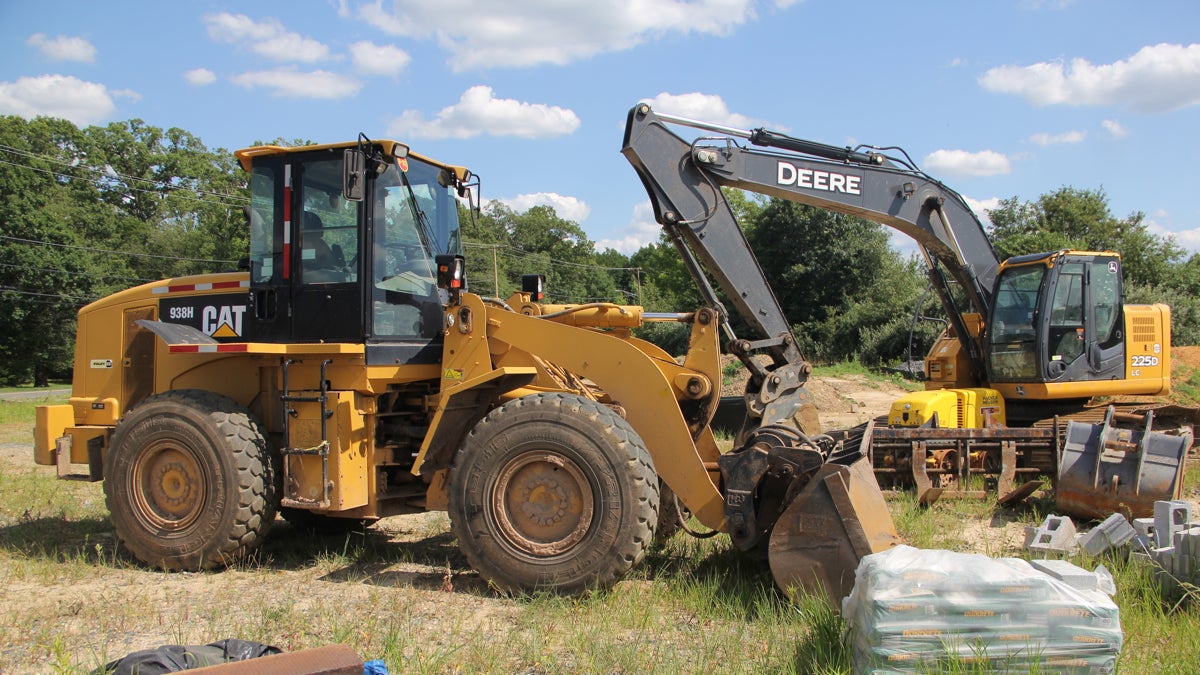Construction equipment growing legs on New Jersey job sites
Listen
An increase in the theft of construction equipment in New Jersey can be attributed to the abundance of work created by Superstorm Sandy. (Emma Lee/WHYY)
New Jersey now ranks fifth in the nation for thefts of backhoes and other construction equipment, according to rankings from the stolen vehicle tracking company LoJack.
The jump in thefts of heavy construction equipment in the Garden State is yet another legacy of Superstorm Sandy.
The thefts are up because New Jersey is where there’s lots of work. From adding truck lanes to more miles of the Turnpike to reconstruction projects from Superstorm Sandy, there is high demand for backhoes, dump trucks and other equipment. In early July, a John Deere front-end loader worth $1 million vanished from a construction site in South Brunswick near exit 8A on the Turnpike.
Lt. Jim Ryan of the South Brunswick Police Department said thieves often use a backhoe and dump it quickly. Others test to see if anyone will track the stolen equipment with LoJack or GPS.
“So the thieves will typically take it and leave it out in a remote location to see if law enforcement or even the owner can locate it,” Ryan said. “And if they come to realize that after a couple of weeks no one’s come to locate it, then they realize it probably doesn’t have a tracking device and then they’ll move it to wherever the permanent location is.”
Courtney DeMilio, associate vice president for LoJack’s commercial division, said that permanent location is “usually within within 65 miles, so they’re stealing it to use it. They can take that backhoe and use it all weekend long and generate revenue, and then ditch it.”
DeMilio also says while the national economy was in the tank, post-Sandy rebuilding meant a lot of work in New Jersey.
“In construction, you know, the equipment goes where the work is, especially in power-side issues, so you’ve got 36 [kilowatt] generators and welders,” she said. “They have legs, and they’re easy to take and use on jobs like that. They’re also in high demand for drug making, so you’ve got a down economy that brings out the ‘bad business’ and you’ve got Sandy that brought about a lot of new construction work.”
DeMilio says illegal drug makers steal generators to avoid attracting attention with excessive electricity use. Dishonest contractors may pilfer equipment to make money they feel they should be earning, or resort to theft as an act of desperation.
Ryan said that while investigating the theft in South Brunswick, he found out when minor items go missing, it can be a warning.
“This job site in particular has some minor thefts before, so if you have a job site that’s having minor thefts, or you have a lot of high contractor turnover, be aware of a larger theft possibly taken place,” he said.
Absconding with heavy construction equipment is somewhat like stealing a car. These trucks are considered vehicles, so a first-time conviction carries the same penalty: a $500 fine and one-year suspension of a driver’s license. But while taking construction equipment usually requires the inconvenience of a trailer, starting a machine is much easier, said Ryan.
“It’s a universal key. So if I have a key to my machine, I also have a key to your machine,” he said.
Further complicating the process is construction equipment does not have a standard vehicle ID system as cars do.
And police have a hard time identifying stolen equipment while it’s on the road. If there’s no cause to be suspicious, officers can’t stop a vehicle and run a check.
The National Equipment Register, a nationwide database for sharing information about stolen equipment, said thieves take $1 billion worth of goods every year. In 2013, nearly 11,000 pieces went missing and typically, only 20 percent is recovered.
The front end loader stolen in South Brunswick did not have a GPS tracking device, and Ryan said they should be made mandatory.
“I can track someone’s cell phone, you know, around the country but a $200,000 or $500,000 piece of equipment has no tracking mechanism,” he said.
Both Ryan and DeMilio say guard dogs, fencing and security guards can help deter would-be thieves, keeping heavy equipment safe from those with a light touch.
WHYY is your source for fact-based, in-depth journalism and information. As a nonprofit organization, we rely on financial support from readers like you. Please give today.




